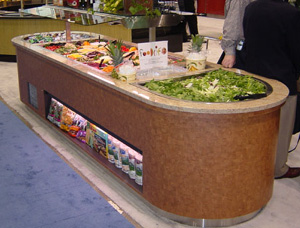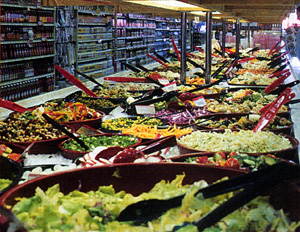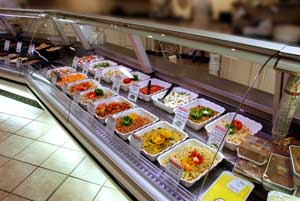Delicatessen Salads in Refrigerated Supermarket Cabinets
The right deli display case lighting brings out the natural colors of deli salads, and will extend deli salad shelf life by minimizing shrinkage and spoilage.

Spoilage of Deli Salads in Refrigerated Showcases
Damaging light radiation can penetrate clear saran wrappings and will raise surface temperatures of salads even in refrigerated display case environments and in deli cases with humidifiers and misters.
The combined exposure of light and oxygen can cause fats to become rancid, while raised temperatures provide an ideal environment for the growth of bacteria and food borne pathogens especially in salads containing eggs, mayonnaise, and dairy products.
Even small temperature increases can lead to food poisoning, and display case lighting has been shown to increase the surface temperature of displayed food by 10° F or more. An increase of 2° F can make seafood salads unsafe within two to four hours.
Designed for true color definition, Promolux fluorescent lamps and LEDs have a more balanced visible spectrum than other fluorescent lamps. The yellow and green wavelengths that are predominant in regular fluorescent lighting are the most damaging wavelengths in the visible spectrum. Promolux lamps and LEDs emit a more balanced range of wavelengths, including more of the red and blue wavelengths and more moderate levels of the yellow and green wavelengths. Promolux deli display case lighting brings out the natural colors of deli salads, and extends shelf life by reducing shrinkage and spoilage.
Dehydration of Deli Salads in Retail Merchandisers

Most deli display case lighting emits heat as well as ultraviolet (UV) and damaging visible spectrum radiation, which can raise temperatures of deli salads, quickly drying them out. Deli shops and food service stations lose money when salads that are sold by weight become dehydrated.
Fruit salads and leafy green salads wilt under the dehydrating effects of deli display case lighting, and jello salads form a tough skin.
Salads with mayonnaise dressings such as macaroni salad and tuna salad require frequent stirring to keep them looking fresh and to prevent the surface from hardening and forming an unappetizing dry surface layer.
Salad Bars in Grocery Store Deli Departments

Salad bars containing leafy green vegetables and fruit salads need constant maintenance to prevent dehydration and other damaging effects caused by display case lighting. Jello also dehydrates quickly, becoming tough and rubbery. Wilted lettuce is unappetizing, and the loss of water in salad bar items leads to lost profit when the salad is sold by weight.
Retail display case lighting that emits high levels of UV and visible spectrum radiation raises the surface temperature of foods on display, even if the salad bar is refrigerated.
Dairy products such as cottage cheese and creamy salad dressings are sensitive to the effects of light. Within four minutes of exposure to ultraviolet light, the fats in milk and cream turn rancid and lose nutrients, particularly riboflavin and vitamin A.
Stores that throw away salad bar items every two hours to be sure that everything is fresh, lose money that could be saved by changing the lighting to Promolux low UV lamps which minimize spoilage and dehydration.

Promolux True Color Definition Lamps
Promolux lamps emit a more balanced range of wavelengths, including more of the red and blue wavelengths and more moderate levels of the yellow and green wavelengths which are great for salad bars and food service counters where there is a wealth of bright natural colors and fresh offerings.
With Promolux, food stores see results right away in reduced waste and greater sales through improved visual presentation which boosts consumer impulse spending.
